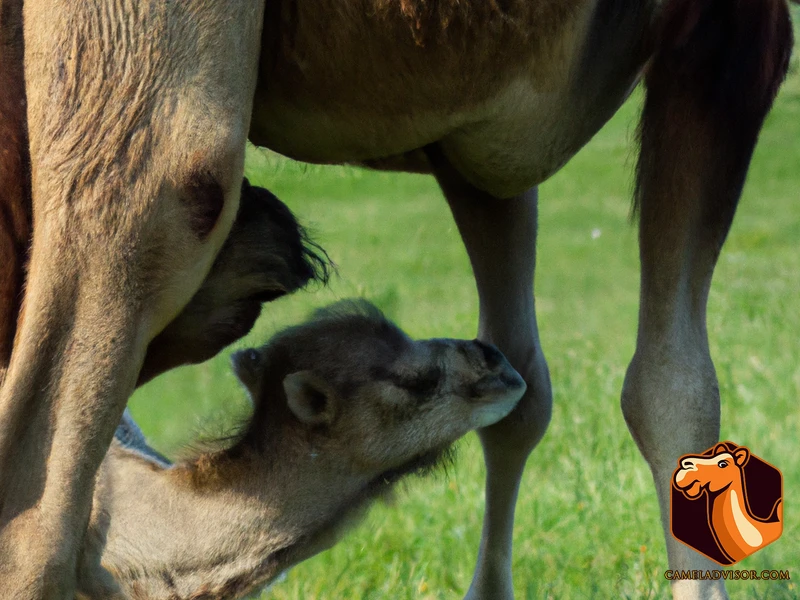As a crucial component of newborn camel health, colostrum has been the subject of extensive research and debate within the scientific community. Despite its critical importance, many misconceptions still surround colostrum intake in both wild and domestic camels. This article aims to shed light on the function, benefits, and challenges of colostrum feeding, in addition to outlining best practices associated with this critical stage of a newborn camel’s life. Whether you are a camel breeder or simply interested in the science behind colostrum, this article is a must-read for anyone seeking a deeper understanding of this vital substance.
Contents
What is Colostrum?

As a parent or caregiver of a newborn camel, you might have heard of the term ‘colosturm’, but are unsure of what exactly it is. Colostrum is a crucial fluid that plays a significant role in the health and wellbeing of newborn camels. It is the primary source of nutrition and immune support for baby camels during the first few days of their life. It contains essential nutrients and immunoglobulins that help to boost the calf’s immune system and protect them from various diseases and infections. In the following sections, we will take a closer look at the composition and function of colostrum, and why it is so important for newborn camel health.
Composition of Colostrum
Colostrum is a nutrient-rich mammary secretion produced by mother camels during the first few days after birth. Colostrum is essential for the survival and growth of newborn camels due to its unique composition.
The table below shows the composition of camel colostrum:
| Component | Amount in colostrum |
|---|---|
| Immunoglobulins (IgG) | 30-50 g/L |
| Lactoferrin | 0.5 g/L |
| Lactoperoxidase | 6 mg/L |
| Growth factors | Variable |
| Fat | 4-10% |
| Protein | 12-15% |
| Carbohydrates | 5-6% |
As seen in the table, immunoglobulins (IgG) are the most abundant component of camel colostrum. IgG is an antibody that provides passive immunity to the newborn by protecting them against infectious diseases. It is also important to note that camel colostrum contains higher amounts of IgG compared to other domestic animals such as cows and goats.
Lactoferrin and lactoperoxidase are proteins that have antimicrobial properties and can prevent the growth of harmful bacteria in the newborn’s gut. These proteins are also important for the development of the immune system.
Camel colostrum also contains growth factors that promote the growth and development of body tissues. These growth factors are important for the development of the nervous system, bones, and muscles.
Camel colostrum is composed of a unique combination of nutrients and bioactive compounds that provide essential nutrients for the newborn camel’s growth and protection against infectious diseases. It is crucial for newborn camels to receive colostrum within a few hours of birth to avoid health problems.
Function of Colostrum
Colostrum, which is the thick and yellowish “first milk” produced by female camels after giving birth, plays a crucial role in the health and development of newborn camels. As a rich source of nutrients and immune factors, colostrum serves several important functions, including:
- Providing passive immunity: Colostrum contains high levels of antibodies, which are proteins that help protect against infections. When a baby camel ingests colostrum, these antibodies are absorbed into its bloodstream and provide temporary immunity until its own immune system develops.
- Stimulating gut development: Colostrum is rich in growth factors that promote the growth and maturation of the intestinal lining. This helps prepare the baby camel’s digestive system to digest and absorb nutrients from milk and other foods.
- Supporting metabolic processes: Colostrum is high in energy and provides essential nutrients such as proteins, fats, and carbohydrates. These nutrients are necessary for the newborn camel to fuel its metabolic processes and maintain its body temperature.
- Promoting bonding between mother and offspring: Colostrum contains pheromones and other compounds that help the baby camel recognize and bond with its mother. This promotes the baby’s sense of security and reduces stress.
Without adequate colostrum intake, baby camels are at risk of developing various health problems, including infections and malnourishment. It is crucial to ensure that newborn camels receive enough colostrum in the first few hours of life. To learn more about the importance of colostrum and other aspects of newborn camel health, you can visit /newborn-camel-health-problems-solutions/.
Colostrum and Camel Health
As newborn camels enter the world, they require proper nourishment and care to thrive. One crucial component of their health is obtaining the vital nutrients provided by colostrum. Camel owners must understand the importance of colostrum intake and its impact on a camel’s long-term health. The benefits of colostrum are numerous, and ensuring that baby camels receive sufficient amounts at the right time can prevent various health issues. Let’s explore why colostrum is so essential for the health of newborn camels. If you want to learn more about overall newborn camel care, check out our article on Newborn Camel Care.
Benefits of Colostrum for Baby Camels
Colostrum, the first milk produced by female camels after giving birth, is essential for the health and survival of baby camels. It is a rich source of nutrients and bioactive molecules that provide a wide range of benefits to the newborn. These benefits are discussed in detail in the following table:
| Benefit | Description |
|---|---|
| 1. Immune protection | Colostrum contains high levels of immunoglobulins, antibodies, and other immune-related components that help protect the newborn from infections and diseases. It also stimulates the development of the immune system and promotes the production of white blood cells. |
| 2. Nutrient supply | Colostrum provides a rich source of energy, protein, fat, vitamins, and minerals that are necessary for the growth and development of the newborn. |
| 3. Digestive tract development | The bioactive molecules in colostrum help to prepare the newborn’s digestive system for the digestion and absorption of solid food. They also promote the growth of beneficial bacteria in the gut, which helps to prevent infections. |
| 4. Hormonal regulation | Colostrum contains hormones such as insulin, growth hormone, and cortisol, which help to regulate the newborn’s metabolic processes and promote growth and development. |
| 5. Reduced mortality | Baby camels that receive adequate amounts of colostrum are less likely to die from infections and other health complications. Colostrum helps to strengthen the immune system and provide the nutrients needed for survival. |
It is important for camel breeders to ensure that newborn camels receive sufficient amounts of colostrum in the first few hours of life. This helps to maximize the benefits of colostrum and promote the health and survival of the newborn. More information on how to care for newborn camels can be found at /doc-rec-keep-newborn-cam-care/.
Colostrum Intake in Wild and Domestic Camels
Colostrum intake is essential for both wild and domestic camels. Strong and healthy camel calves are necessary for the survival of the species, especially in areas where they are exposed to a harsh environment.
In Wild Camels
In the wild, baby camels are left alone for the first few days of their lives until their mother returns to feed them. The mother only allows the calf to drink colostrum, and after that, she produces milk for regular feeding. The amount of colostrum produced can vary depending on the mother’s age, nutrition, and health status.
In Domestic Camels
In domestic camels, colostrum feeding practices may vary. Some breeders separate the newborn from their mother to ensure they drink an adequate amount of colostrum. Others leave them with their mother but monitor their intake. This is especially important if the mother has a history of inadequate colostrum production.
Regardless of the method, domestic camels need to receive colostrum within the first few hours after birth to ensure they get the right amount of antibodies to protect them from infections.
It’s also important to note that baby camels should not be fed cow or goat colostrum because it doesn’t provide the necessary antibodies specific to camel’s needs.
Conclusion
The importance of colostrum intake cannot be overstated in the first few hours of a baby camel’s life. It provides the necessary antibodies that protect them from infections, making it crucial for their survival. To learn more about raising a healthy baby camel, check out our article on feeding schedule for newborn camels and weaning.
Colostrum Feeding Practices

When it comes to raising a healthy newborn camel, it is essential to understand proper colostum feeding practices. Colostrum is vital for a camel’s immune system and overall health, and inadequate intake can lead to long-term health issues. However, it’s not just about providing any amount of colostrum – the timing and amount also play a significant role in ensuring the camel’s health. In this section, we will discuss the best practices for colostrum feeding and the challenges one may face while doing so.
Timing of Colostrum Feeding
The timing of colostrum feeding is crucial for the health and survival of a baby camel. It is recommended that the baby camel receives colostrum within the first 12 hours of life as the gut of the newborn camel becomes less permeable to antibodies after this time period.
Ideally, the baby camel should be allowed to suckle from its mother to receive colostrum, which is a natural and efficient way for the baby camel to consume it. In cases where the mother camel is unavailable, inadequate, or unable to produce enough colostrum, a bottle or tube feeding of a colostrum substitute may be necessary.
It’s important to note that if the newborn camel is sick, delaying colostrum intake can lead to a lack of nutrients and an increased risk of infection. It’s crucial to seek veterinary assistance and ensure that the baby camel receives adequate colostrum intake as soon as possible.
In addition to the timing of the colostrum intake, the environment where the baby camel receives colostrum is also important. The area should be clean, dry, and warm to minimize the risk of infections. The baby camel should also be monitored closely to ensure that it is nursing properly and is receiving enough colostrum.
It’s always advisable to seek professional advice when it comes to newborn camel care, as each situation may be different. The timing and amount of colostrum needed may vary depending on the health and condition of the baby camel. A veterinarian or experienced camel handler can provide advice on the best practices for colostrum feeding to ensure the health and survival of the newborn camel.
How much Colostrum is Needed?
How much colostrum is needed for a newborn camel?
The amount of colostrum required by a newborn camel typically depends on the birth weight of the camel calf. In general, the calf should receive around 10% of its birth weight in colostrum within the first six hours of being born. For example, a camel calf weighing 30 kg at birth should consume at least 3 kg of colostrum in the first six hours.
It is essential to ensure that the newborn calf has enough colostrum, as a deficiency in colostrum intake can lead to severe health complications. The colostrum is crucial as it contains immune-building properties that protect the baby camel from infections and diseases in the first few months of its life.
It is recommended to split the colostrum into several feedings within the first six hours of birth. The first feeding should be immediate after birth, within the first hour, and then every two to three hours, depending on the calf’s weight until sufficient colostrum has been consumed.
If a newborn camel calf does not receive adequate colostrum within the first few hours of life, it may require a blood transfusion or substitute colostrum. Such a deficiency can lead to weaker immune systems, which can result in growth and developmental problems.
Newborn camel calves require an adequate amount of colostrum within the first six hours of birth for proper development and immune system building. It is essential to pay close attention to the timing and quantity of colostrum feeding to support the newborn calf’s health and growth.
Challenges in Colostrum Feeding
Feeding newborn camels can prove to be a challenging task, especially when it comes to the crucial process of providing colostrum to the young camel. Although colostrum is an essential component of a newborn camel’s health, there are a few challenges that arise in ensuring adequate intake. These include the risk of inadequate colostrum intake and the need for artificial colostrum substitutes. It’s important to understand these challenges to ensure that newborn camels receive the best possible care in their early moments of life.
Inadequate Colostrum Intake
Inadequate colostrum intake can be a serious problem for newborn camels. Camels that do not receive enough colostrum within the first 12 hours of birth are at risk of developing infection, disease, and even death. This is because colostrum contains essential antibodies that help to protect the camel from common diseases and infections.
Some common reasons why a newborn camel may not receive enough colostrum include: the mother may not produce enough colostrum, the baby may not be able to properly latch onto the mother’s teat, or the baby may be separated from the mother and unable to feed. If inadequate colostrum intake is suspected, it is important to seek veterinary assistance immediately.
There are several signs that may indicate inadequate colostrum intake in a newborn camel, including: lethargy, weakness, reluctance to stand or move, and failure to nurse. In some cases, a blood test may be necessary to determine if the camel has received enough colostrum.
If inadequate colostrum intake is confirmed, there are several options for treatment. Bottle feeding with a colostrum substitute may be necessary, or the newborn camel may need to be transferred to another mother who has an adequate supply of colostrum. With prompt action and proper treatment, most camels can recover from inadequate colostrum intake.
It is important to note that adequate colostrum intake is just one factor in ensuring the health and well-being of newborn camels. Proper newborn camel environment and training are also important for maximizing the health and potential of these amazing animals.
Artificial Colostrum Substitutes
Artificial Colostrum Substitutes are used when natural colostrum is not available. Though it is not the best option for a newborn camel, it can still provide some benefits. Some of the commonly used substitutes include cow colostrum, commercial colostrum replacers, or serum-based supplements. These substitutes are made from cow colostrum or blood plasma and are similar in composition to camel colostrum. However, it should be noted that artificial substitutes cannot match the uniqueness of the natural colostrum that camel produces.
The use of artificial colostrum substitutes can cause health problems for baby camels such as failure to thrive, diarrhea, or infections. Hence, it is best that natural colostrum is given, but if that is not possible, then substitutes should be used until natural colostrum is available. It is important to note that an artificial colostrum substitute should only be used as a last resort when natural colostrum is not available.
| Advantages | Disadvantages |
|---|---|
| Provides some level of protection against diseases | Doesn’t provide the same level of immunity as natural colostrum |
| Can help improve the growth rate of baby camels | Can cause digestive issues such as diarrhea or constipation |
| Contains nutrients that are important for the development of the immune system | May not be readily available in all areas |
| Can be stored for long periods of time | May not be affordable for everyone |
If you need to bottle-feed a newborn camel with an artificial colostrum substitute, it is important to follow the manufacturer’s instructions carefully. Also, ensure that the hygiene of the feeding equipment is appropriately addressed to avoid any contamination risks. The environment in which baby camels are raised is also essential for their survival and growth. Learn more about newborn camel environment and training for better camel care.
Conclusion
In conclusion, Colostrum is a crucial component in the health and development of newborn camels. It provides essential nutrients and anti-bodies to help protect the young camel from disease and infections. Camel breeders and farmers must ensure that newborn camels receive adequate colostrum during their first few hours of life. As mentioned, Inadequate colostrum intake could lead to a weak immune system, slow growth, and even death.
Furthermore, it is essential to follow good camel management practices such as timely feeding, proper hygiene, and regular monitoring. If a newborn camel is unable to receive sufficient colostrum naturally, artificial colostrum substitutes can be used. However, proper care and monitoring will be required to ensure the substitute provides the necessary nutrition for the young camel. Moreover, it’s always best to bottle-feed newborn camels colostrum instead of giving them an artificial substitute.
In a nutshell, the importance of colostrum for newborn camel health cannot be overemphasized. Every effort should be made to ensure that newborn camels receive adequate colostrum intake within the first few hours of birth to achieve healthy growth, strong immunity, and high survival rates. By practicing good colostrum feeding habits and overall camel management, camel breeders and farmers can ensure that their herds remain healthy and productive.
Frequently Asked Questions
Question 1?
What is colostrum?
Answer:
Colostrum is the first milk produced by mammals, including camels, during the initial few days after giving birth.
Question 2?
What nutrients are present in colostrum?
Answer:
Colostrum contains a rich source of proteins, lipids, carbohydrates, vitamins, minerals, immunoglobulins, growth factors, and enzymes.
Question 3?
How is colostrum different from regular milk?
Answer:
Colostrum contains a high concentration of immunoglobulins, specifically IgG, which is not present in regular milk.
Question 4?
Why is colostrum important for newborn camel health?
Answer:
Colostrum plays a critical role in providing passive immunity, nourishment, and growth factors essential for newborn camel health.
Question 5?
When should a newborn camel be fed colostrum?
Answer:
Ideally, a newborn camel should be fed colostrum within the first few hours of birth to ensure the maximum benefits of passive immunity.
Question 6?
How much colostrum should a newborn camel consume?
Answer:
A newborn camel should consume about 10-15% of its body weight in colostrum within the first 24 hours of birth.
Question 7?
Can a newborn camel survive without colostrum?
Answer:
No, a newborn camel cannot survive without colostrum as it provides essential nutrients, growth factors, and passive immunity.
Question 8?
What are some of the challenges in colostrum feeding for newborn camels?
Answer:
Inadequate colostrum intake, rejection from the mother, and the unavailability of colostrum substitutes are some of the challenges in colostrum feeding for newborn camels.
Question 9?
What are some of the benefits of colostrum for adult camels?
Answer:
Colostrum has been shown to possess antibacterial, antiviral, and immunomodulatory properties, making it beneficial for the overall health and immune function of adult camels.
Question 10?
Can colostrum be used as a dietary supplement for humans?
Answer:
Yes, colostrum has been used as a dietary supplement for humans due to its high nutrient content and immune-boosting properties.







